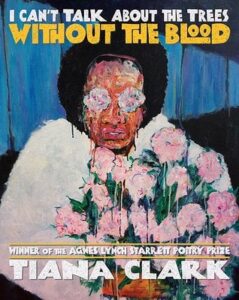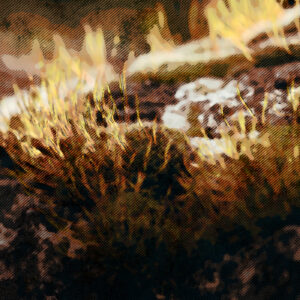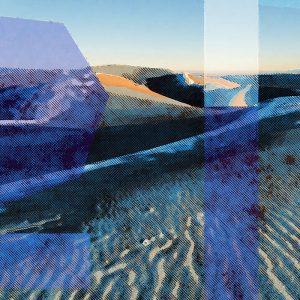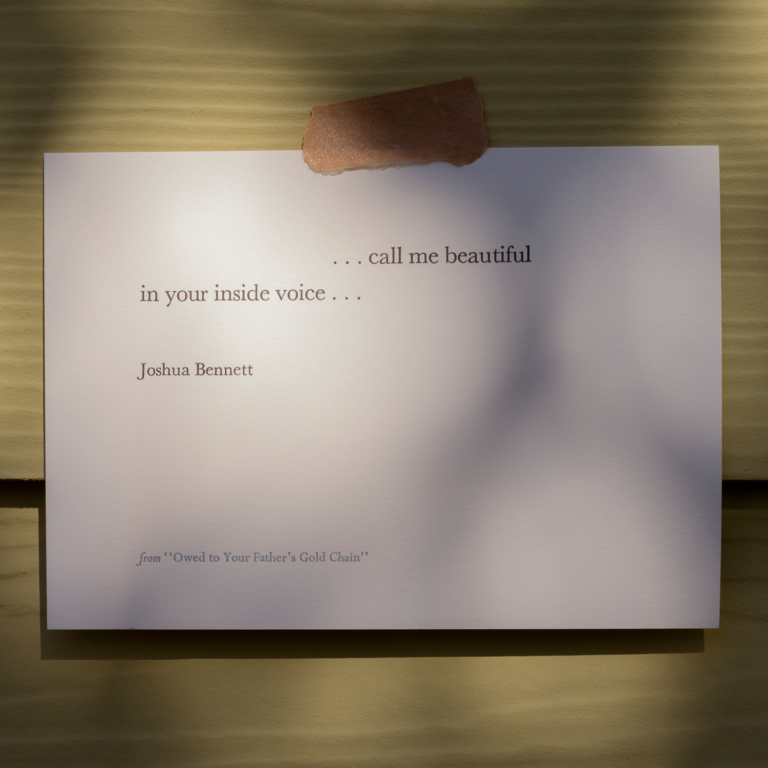Tiana Clark
My Therapist Wants to Know about My Relationship to Work
Life can feel exhausting sometimes: how do you find rest?
We’re pleased to offer Tiana Clark’s poem, and invite you to sign up here for the latest from Poetry Unbound.
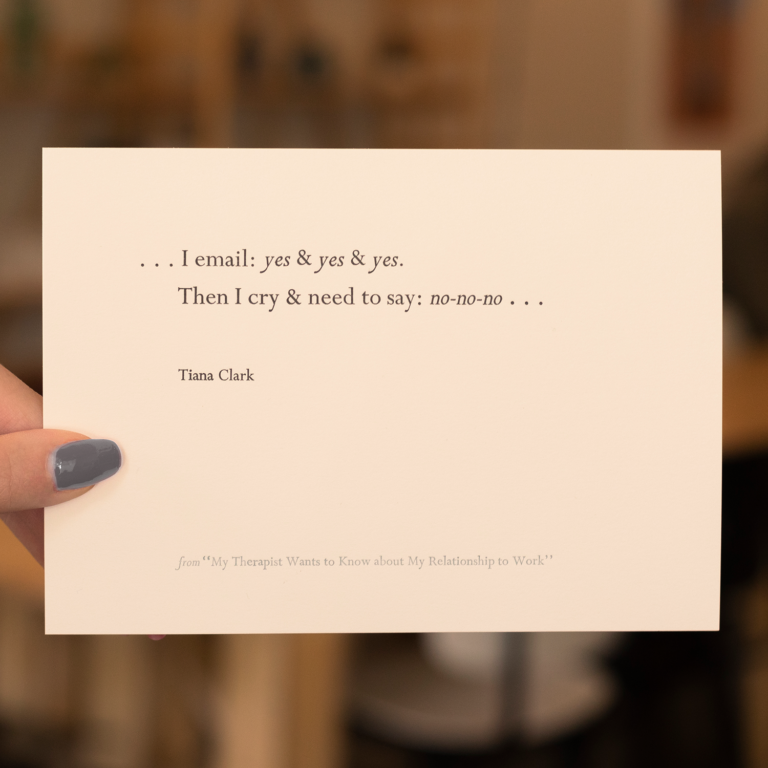
Letterpress print by Myrna Keliher. Photography by Lucero Torres. © All Rights Reserved.
Guest

Tiana Clark is the author of the poetry collection, I Can’t Talk About the Trees Without the Blood (University of Pittsburgh Press, 2018), winner of the 2017 Agnes Lynch Starrett Prize, and Equilibrium (Bull City Press, 2016), selected by Afaa Michael Weaver for the 2016 Frost Place Chapbook Competition.
Transcript
Transcription by Heather Wang
Pádraig Ó Tuama: My name is Pádraig Ó Tuama, and a good few years ago I got a dream job, something that I always wanted. And I loved it. But what was so surprising to me was that after a few months I began to feel this unease in myself, like, Oh, that job was supposed to do something for me. And I was so burdened to try to make sure to do a good job, I was probably working too hard, too long. I always get up early anyway, so I started to read poetry for a few hours before I started to turn my attention to work. And it helped me so much, to turn to something that returned me to myself before I went about something else that I loved.
[music: “Praise the Rain” by Gautam Srikishan]
“My Therapist Wants to Know about My Relationship to Work” by Tiana Clark — Tiana Clark:
“I hustle
upstream.
I grasp.
I grind.
I control & panic. Poke
balloons in my chest,
always popping there,
always my thoughts thump,
thump. I snooze — wake & go
boom. All day, like this I short
my breath. I scroll & scroll.
I see what you wrote — I like.
I heart. My thumb, so tired.
My head bent down, but not
in prayer, heavy from the looking.
I see your face, your phone-lit
faces. I tap your food, two times
for more hearts. I retweet.
I email: yes & yes & yes.
Then I cry & need to say: no-no-no.
Why does it take so long to reply?
I FOMO & shout. I read. I never
enough. New book. New post.
New ping. A new tab, then another.
Papers on the floor, scattered & stacked.
So many journals, unbroken white spines,
waiting. Did you hear that new new?
I start to text back. Ellipsis, then I forget.
I balk. I lazy the bed. I wallow when I write.
I truth when I lie. I throw a book
when a poem undoes me. I underline
Clifton: today we are possible. I start
from image. I begin with Phillis Wheatley.
I begin with Phillis Wheatley. I begin
with Phillis Wheatley reaching for coal.
I start with a napkin, receipt, or my hand.
I muscle memory. I stutter the page. I fail.
Hit delete — scratch out one more line. I sonnet,
then break form. I make tea, use two bags.
Rooibos again. I bathe now. Epsom salt.
No books or phone. Just water & the sound
of water filling, glory — be my buoyant body,
bowl of me. Yes, lavender, more bubbles
& bath bomb, of course some candles too.
All alone with Coltrane. My favorite, ‘Naima,’
for his wife, now for me, inside my own womb.
Again, I child back. I float. I sing. I simple
& humble. Eyes close. I low my voice,
was it a psalm? Don’t know. But I stopped.”
[music: “Waterbourne” by Blue Dot Sessions]
The first time I encountered this poem I thought it was genius. Tiana Clark read it for the Poetry Foundation. And then I searched it out, and, my God, what an extraordinary poem, verb after verb after verb after verb.
I found myself wondering who was speaking and what’s happening in their life. And the person speaking in the poem is a writer, who likes coffee and social media and trying to keep up with journals; who has a lot to do. And there’s a complicated world of comparison, in the life of the speaker in this poem, who is paying attention, in therapy, to the relationship with work. And work seems to be art. And art, when it’s your work, can be a complicated beast of a thing, because the very thing that gives you life can sometimes cause you great anxiety, as you’re trying to make your living from the thing that you love to do.
That isn’t only for artists, it’s for so many people. They love to do something, but doing it so often can make it a complicated relationship.
[music: “Waterbourne” by Blue Dot Sessions]
As we’re in the life of this speaker, so much narrative detail is given just by verbs: “I hustle,” “grasp,” “grind,” “control,” “panic,” “poke,” “snooze,” “wake,” “go,” “scroll,” “see,” “like,” “heart.” You can see somebody using a phone on social media, “heart”-ing the picture of their new poem or whatever it is that they’ve just gotten published.
And then that amazing line: “Did you hear that new new?” — the new thing, and then the new, new thing. How exhausting it can be to try to keep up with everything. And in the underground of keeping up with everything, there is a sense of comparison and the way that comparison can be the death of art, because no art, really, should be compared. And this poem in a certain sense is winding into a deep anxiety. Over and over again at the start of this poem, the verbs are conjugated with the “I” — the “I hustle,” the “I snooze,” “I scroll,” “I see.”
And then even that “I” begins to disappear for a few lines: “New book. New post. / New ping. A new tab, then another. / Papers on the floor, scattered & stacked.” The self is being overwhelmed, disappearing under a pile of books to be read, things to be done, things to be compared to, new, amazing things to be marveled at and not be jealous at. It’s all there, piling up, and the person is disappearing.
And then there is a crisis.
[music: “Toothless Slope” by Blue Dot Sessions]
The turning point of this poem comes after so much pressure has been building. And the way I read it, the turning point comes when the “I” comes back in after that short absence of the “I”: “I balk. I lazy the bed. I wallow when I write.” Seeming unproductivity is coming in here, in the productivity of all the things to do, of all the things to like, of all the communications, of all the returning texts that you need to do. And then suddenly, the balk happens. And the experience of reading comes in there, after the wallowing — Lucille Clifton; Phyllis Wheatley, three times.
And then Tiana Clark writes, on a napkin, receipt, or a hand, or a page. It’s a failure, and it’s deleted, but it’s the work of writing. And after that comes the experience of being in the body. There is little comparison, as this poem turns toward great consolation and great comfort. There’s tea and bathing and salt and lavender and smell. What I think is so wise about this poem is that it isn’t just a poem about having to pay attention to your relationship with social media. Social media’s just the latest thing. This really is saying, what’s your relationship with comparison? What’s your relationship with burden? And how can you tend to yourself and the self from which the art comes? How can you pay attention to your need to wallow, your need to turn away, your need to turn off, your need, perhaps, to allow yourself to feel lazy, in order for the art to emerge?
That, I think, is an extraordinary wisdom of this poem. It makes it timeless. It starts off so time-focused, in the particularity of “I heart.” People 50 years ago wouldn’t have known what some of the conjugations of verbs at the start here are, because they’re so much about the relationship with your phone. But this poem goes deeper than the time-constraint imagination of how people with social media behave, and it goes much more elemental: into the experience of being in yourself, of paying attention to what nurtures you — your literary ancestors, your literary influences, your literary mothers — and then goes into the body, into the bath, into the experience of something like a psalm, something that lifts you up — also an old form.
[music: “Toothless Slope” by Blue Dot Sessions]
I always feel like this poem is an extraordinary demonstration in the usage of pressure and tone in the voice. I always feel a bit anxious when I read the earlier part, and I always notice that my voice changes as the poem goes on, especially reaching towards the bath, and then turning toward the very last line, “was it a psalm? Don’t know. But I stopped.”
Was what a psalm? [laughs] You know? The bath, or the music, or the tea, or the tending to yourself; or maybe it was the “I lazy the bed,” maybe that was the psalm, or turning to Lucille Clifton and Phyllis Wheatley. Or maybe it was the attempt of writing on the napkin or on the back of the hand or on the receipt, or screwing it up, or throwing it away, or deleting it. And in brilliance, what this poem says is, “Don’t know. But I stopped.”
Stopped what? Stopped the kind of energy that was causing the self to be ripped apart from the self, that was causing the collapse of language. And the effect is in the body:
“inside my own womb,” “I child back. I float. I sing. I simple / & humble. Eyes close. I low my voice.” The poem culminates in the kind of relief that you would’ve wished for the speaker of the poem and the kind of space from which you would hope some more art would come — not in the place of frenetic comparison, but in the place of deep creativity and presence of the self with the self.
[music: “Family Tree” by Gautam Srikishan]
This poem is so specific about experience of a writer paying attention to their work, working, hugely committed, and then living with the complications that can come from being so focused. I think everybody can relate to this. We’ve all got experiences in our lives where the things that we love, something that’s important in our life, can become a burden — keeping up the burden of connection, the burden of responding. And this poem I think invites all of the you’s who are listening to it — me, everybody listening to it — to think, what are the verbs that guide my life? What are the turns? How can I pay attention to what nurtures me, as well as tending to the body and allowing that which is deeper inside then demand to come out?
[music: “Family Tree” by Gautam Srikishan]
“My Therapist Wants to Know about My Relationship to Work” by Tiana Clark — Tiana Clark:
“I hustle
upstream.
I grasp.
I grind.
I control & panic. Poke
balloons in my chest,
always popping there,
always my thoughts thump,
thump. I snooze — wake & go
boom. All day, like this I short
my breath. I scroll & scroll.
I see what you wrote — I like.
I heart. My thumb, so tired.
My head bent down, but not
in prayer, heavy from the looking.
I see your face, your phone-lit
faces. I tap your food, two times
for more hearts. I retweet.
I email: yes & yes & yes.
Then I cry & need to say: no-no-no.
Why does it take so long to reply?
I FOMO & shout. I read. I never
enough. New book. New post.
New ping. A new tab, then another.
Papers on the floor, scattered & stacked.
So many journals, unbroken white spines,
waiting. Did you hear that new new?
I start to text back. Ellipsis, then I forget.
I balk. I lazy the bed. I wallow when I write.
I truth when I lie. I throw a book
when a poem undoes me. I underline
Clifton: today we are possible. I start
from image. I begin with Phillis Wheatley.
I begin with Phillis Wheatley. I begin
with Phillis Wheatley reaching for coal.
I start with a napkin, receipt, or my hand.
I muscle memory. I stutter the page. I fail.
Hit delete — scratch out one more line. I sonnet,
then break form. I make tea, use two bags.
Rooibos again. I bathe now. Epsom salt.
No books or phone. Just water & the sound
of water filling, glory — be my buoyant body,
bowl of me. Yes, lavender, more bubbles
& bath bomb, of course some candles too.
All alone with Coltrane. My favorite, ‘Naima,’
for his wife, now for me, inside my own womb.
Again, I child back. I float. I sing. I simple
& humble. Eyes close. I low my voice,
was it a psalm? Don’t know. But I stopped.”
[music: “Praise the Rain” by Gautam Srikishan]
Chris Heagle: Thank you to Tiana Clark, who gave us permission to use her poem, “My Therapist Wants to Know about My Relationship to Work.” Read it on our website, at onbeing.org.
[music: “Praise the Rain” by Gautam Srikishan]
Poetry Unbound is: Gautam Srikishan, Erin Colasacco, Eddie Gonzalez, Lilian Vo, Lucas Johnson, Kayla Edwards, and me, Chris Heagle.
Our music is composed and provided by Gautam Srikishan and Blue Dot Sessions.
This podcast is produced by On Being Studios, which is located on Dakota land. You may enjoy our other podcasts: On Being with Krista Tippett, Becoming Wise, and This Movie Changed Me. Find those wherever you’d like to listen, or visit us at onbeing.org to find out more.
Books & Music
Recommended Reading
The On Being Project is an affiliate partner of Bookshop.org and Amazon.com. Any earnings we receive through these affiliate partnerships go into directly supporting The On Being Project.





